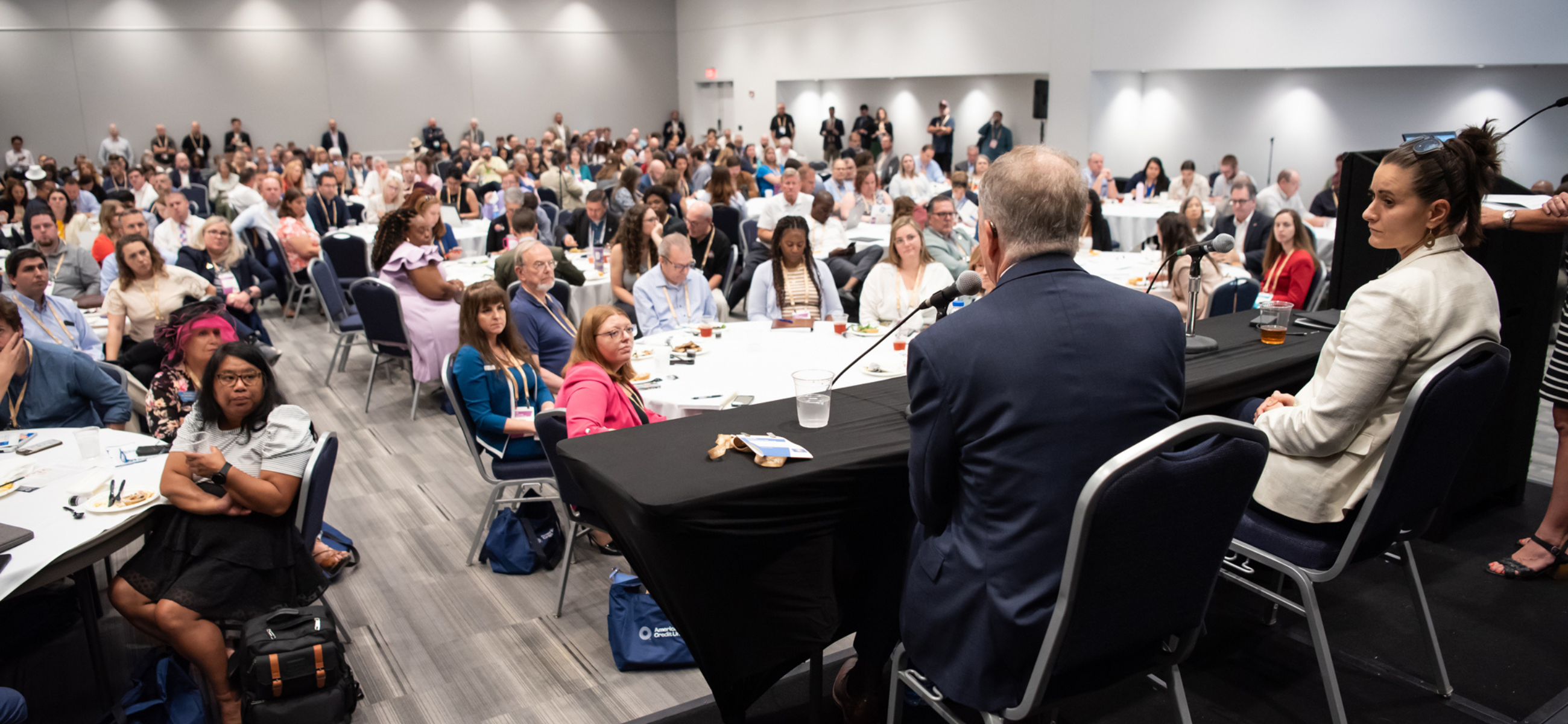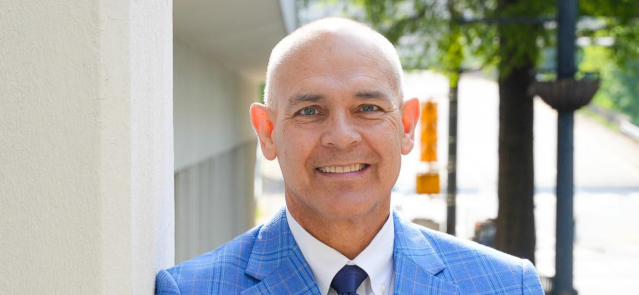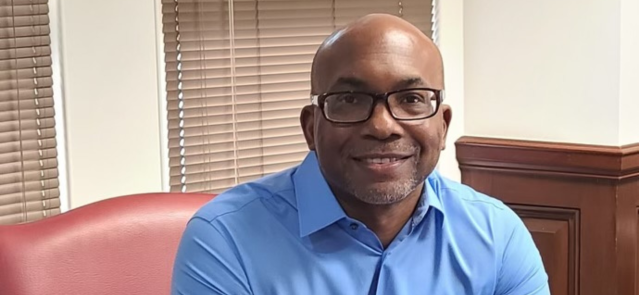Stay ahead of the curve as a political insider with deep policy analysis, daily briefings and policy-shaping tools.
Request a Demo
Attendees gather at the National Conference of State Legislatures summit. (Credit: NCSL)
- Top think tank executives weigh in on crafting policies to help students recover from pandemic
- All agree schools must create new barometers for measuring success besides academic metrics
- Student behavior, cellphones in schools and learning loss identified as key issues for schools
LOUISVILLE, Ky. — State lawmakers should think big when crafting policies to help students recover from the pandemic, leaders of influential education policy groups said Wednesday.
Three top think tank executives — Ross Wiener, vice president at the Aspen Institute; Michael Petrilli, president of the Thomas B. Fordham Institute, an Ohio-based pro-school choice think tank; and Tom Greene, vice president of advocacy for ExcelinEd, an education reform think tank founded by Jeb Bush — joined Washington state Rep. Sharon Tomiko Santos for a panel discussion on education policy.
The panel, which brought together voices from across the ideological spectrum, was part of the National Conference of State Legislatures’ annual summit. Most prominent among education policy issues was the continued recovery from the COVID-19 pandemic, which caused learning losses for many students.
Schools were “left holding the bag” during the pandemic, Wiener said, as they supported children through meals, health care and other areas. States saw an infusion of federal Elementary and Secondary School Emergency Relief funds, but it’s unclear how schools will fare when those funds expire in September.
“Saying, ‘Schools, that’s all on you,’ was an abdication we all have to grapple with,” Wiener said.
Petrilli said states are generally doing a “terrible job” helping students recover.
“We’re not even making up the learning loss,” he said. “We’re going in the other direction. … Just looking at the facts, we are not getting the job done.”
Tomiko Santos, a Democrat who chairs her state’s House Education Committee, said she — like Petrilli — would give policymakers an “F” for their response to the pandemic. She said there needs to be a greater sense of urgency and “we’ve got our heads buried in the sand” if people don’t think the pandemic will have lingering effects on children.
“I’m not so sure that the correct metric is whether or not we are going forward in our academic metrics right now,” Tomiko Santos said. “My question is, how are we measuring and creating the conditions where teaching and learning can thrive?”
The panelists shared which areas of education policy they believe have fallen under the radar over the past few years — and others they think are overblown.
Greene said he hasn’t seen enough effort put into creating pathways to jobs for students.
“We should be preparing our kids to meet that demand for skilled jobs,” he said, but many career and technical education programs don’t align with the demands of a modern workforce.
There’s a crisis of student misbehavior, Petrilli said, and teachers’ top concern is that students are “out of control” postpandemic. Educators don’t feel supported by districts, he said, because of a lack of a desire to discipline students who act out.
“We don’t want to get back to suspending kids willy-nilly,” Petrilli said, but he argued that policymakers need to understand that disruptions make the environment bad for peers and teachers.
Tomiko Santos said lawmakers’ concentration on learning loss is an issue because it drives an emphasis on test score metrics. Instead, she said, states need to focus on transforming education.
She said schools should concentrate on three new “Rs” — relevance and rigor of academic programming, along with helping students build relationships — rather than just reading, writing and arithmetic.
Like Greene, Tomiko Santos said schools should create new avenues for students to get hands-on experiences and learn how to apply classroom skills in the real world.
Wiener also highlighted issues facing students’ mental health and said states should make a school’s learning environment more of a barometer for measuring success than test scores.
He also said “culture war issues” — such as banning books and limiting curricula — are getting too much attention. Wiener said those issues sow mistrust and undermine confidence in schools.
Communities should have a say in what students learn, Wiener said, but it’s a policy area that’s lately been over-politicized.
A brief discussion of cellphone restrictions — a growing trend at statehouses — surfaced during the panel discussion.
Greene called for banning cellphones in schools and said countries with high-performing education systems don’t allow smartphones. He said states should “step in and be the bad guy.”
But Tomiko Santos cautioned that banning phones might be “leaping to a silver bullet response.” Teachers know whether having cellphones in their classrooms is a good or bad idea, she said.
Brett Stover is a Statehouse reporter at State Affairs Pro Kansas/Hawver’s Capitol Report. Reach him at [email protected] or on X @BrettStoverKS.
Know the most important news affecting Georgia
Get our free weekly newsletter that covers government, policy and politics that impact your everyday life—in 5 minutes or less.
Bruce Thompson, transformative Georgia labor commissioner and former state senator, dies at 59
ATLANTA, Nov. 25, 2024 — Bruce Thompson, Georgia’s labor commissioner and a dedicated public servant known for his transformative leadership and open-door policy, passed away yesterday after a battle with pancreatic cancer. He was 59. Thompson, a former Republican state senator and military veteran, was elected labor commissioner in 2022. He took office in January …
Newly minted Senate Minority Leader Harold Jones II: ‘I’m not the typical back-slapping politician’
Nearly 10 years into legislative life, Sen. Harold Jones II wouldn’t change anything about the experience. “I love every minute of it. Even when I hate it, I love it,” the 55-year-old Augusta Democrat told State Affairs. Come January, Jones will add another role to his legislative duties: Senate minority leader, a job held for …
Gov. Kemp calls on state agencies to be fiscally restrained amid record $16.5B surplus
The Gist Gov. Brian Kemp asked the state’s 51 government agencies for continued fiscal restraint when drafting their amended fiscal year 2025 and 2026 budgets. Most agencies adhered to his request even as the state’s general fund surplus hit a record $16.5 billion last month. Forty-five agencies, excluding state courts, followed the governor’s instructions to …
Georgia defies bomb threats as election chief declares a “free, fair and fast” vote amid record turnout
ATLANTA – Despite dealing with over 60 bomb threats, Georgia’s election chief said Tuesday the state’s general election went smoothly. Georgia had a record turnout with nearly 5.3 million people voting, Secretary of State Brad Raffensperger told reporters. Election officials in the state’s 159 counties have until 5 p.m. to certify votes. “We had a …




